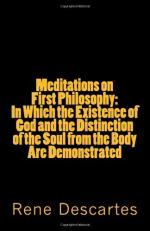Sect. LXXVIII. The Suppositions of the Epicureans are False and Chimerical.
Must we suppose, besides, that atoms have motion of themselves? Shall we suppose it out of gaiety to give an air of reality to a system more chimerical than the tales of the fairies? Let us consult the idea we have of a body. We conceive it perfectly well without supposing it to be in motion, and represent it to us at rest; nor is its idea in this state less clear; nor does it lose its parts, figure, or dimensions. It is to no purpose to suppose that all bodies are perpetually in some motion, either sensible or insensible; and that though some parts of matter have a lesser motion than others, yet the universal mass of matter has ever the same motion in its totality. To speak at this rate is building castles in the air, and imposing vain imaginations on the belief of others; for who has told these philosophers that the mass of matter has ever the same motion in its totality? Who has made the experiment of it? Have they the assurance to bestow the name of philosophy upon a rash fiction which takes for granted what they never can make out? Is there no more to do than to suppose whatever one pleases in order to elude the most simple and most constant truths? What authority have they to suppose that all bodies incessantly move, either sensibly or insensibly? When I see a stone that appears motionless, how will they prove to me that there is no atom in that stone but what is actually in motion? Will they ever impose upon me bare suppositions, without any semblance of truth, for decisive proofs?
Sect. LXXIX. It is Falsely supposed that Motion is Essential to Bodies.
However, let us go a step further, and, out of excessive complaisance, suppose that all the bodies in Nature are actually in motion. Does it follow from thence that motion is essential to every particle of matter? Besides, if all bodies have not an equal degree of motion; if some move sensibly, and more swiftly than others; if the same body may move sometimes quicker and sometimes slower; if a body that moves communicates its motion to the neighbouring body that was at rest, or in such inferior motion that it was insensible—it must be confessed that a mode or modification which sometimes increases, and at other times decreases, in bodies is not essential to them. What is essential to a being is ever the same in it. Neither the motion that varies in bodies, and which, after having increased, slackens and decreases to such a degree as to appear absolutely extinct and annihilated; nor the motion that is lost, that is communicated, that passes from one body to another as a foreign thing—can belong to the essence of bodies. And, therefore, I may conclude that bodies are perfect in their essence without ascribing to them any motion. If they have no motion in their essence, they have it only by accident; and if they have it only by accident,




